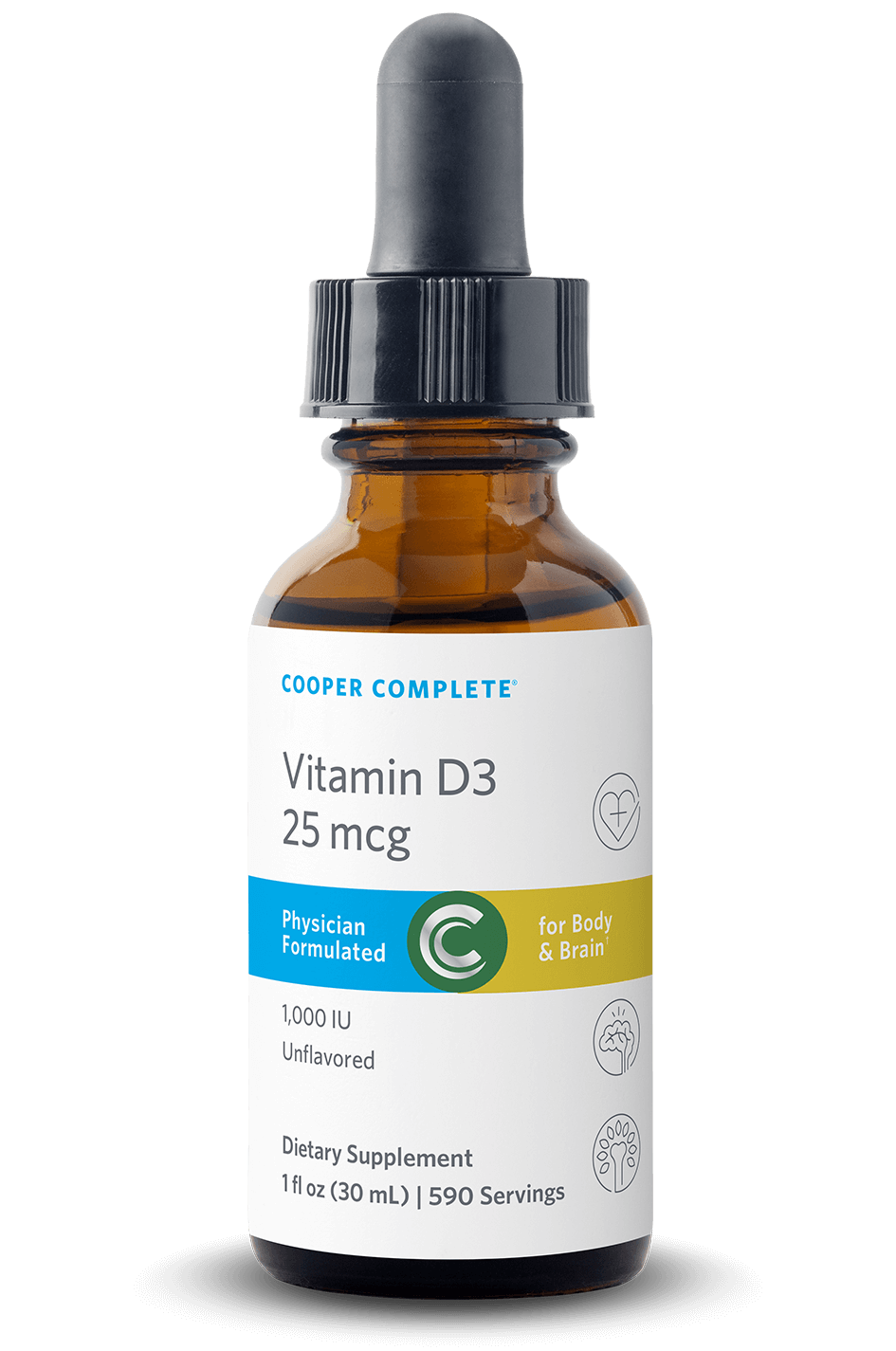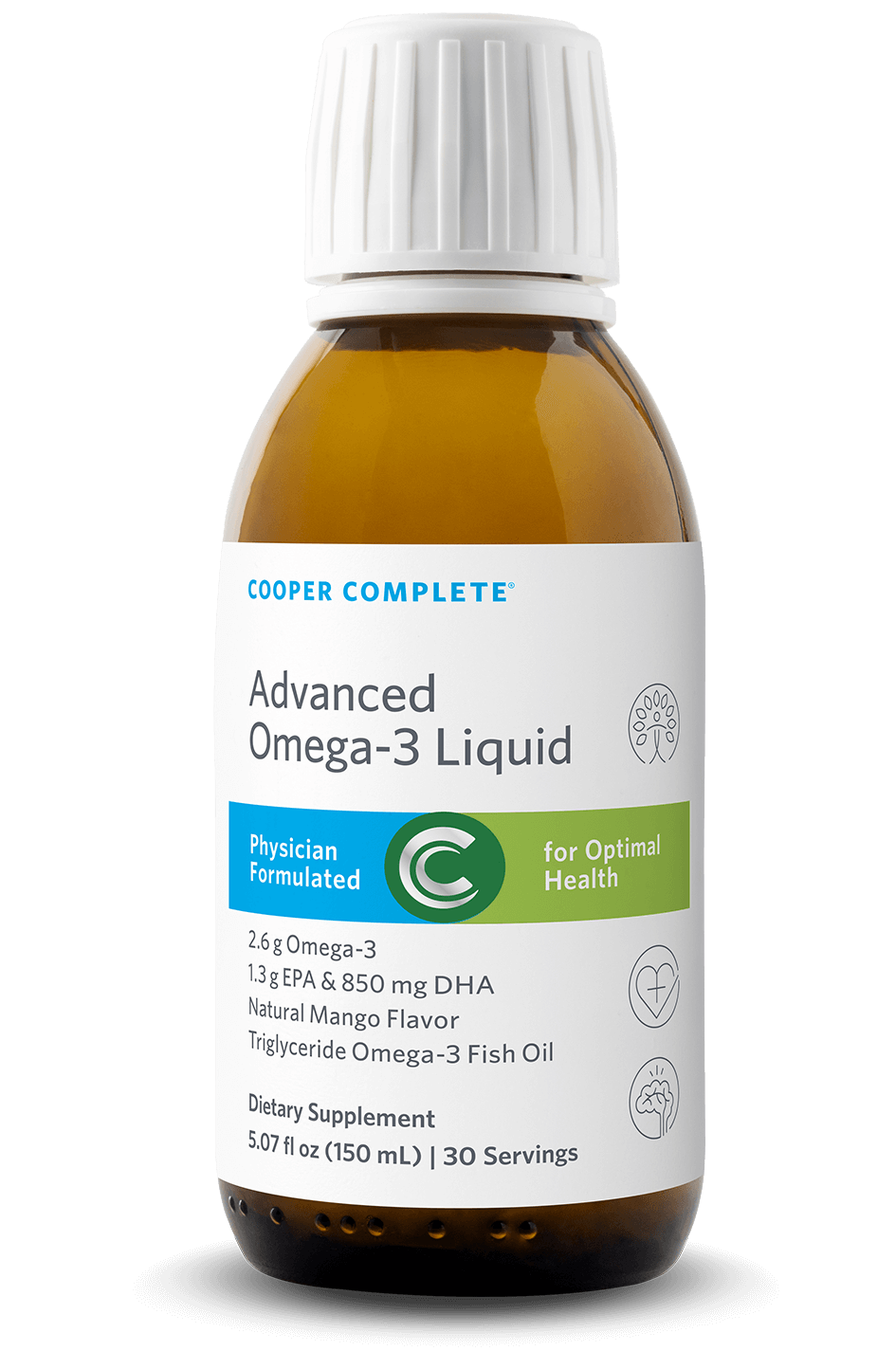Supplement Solutions for Swallowing Difficulties

The ability to swallow without difficulty is something most adults take for granted. But, for as many as 15 million adults, difficulty swallowing – dysphagia – is a condition affecting everyday life. It is estimated that 1 in 25 people experience some form of dysphagia in their lifetime, including 22% of adults age 50 and older.1

Vitamin D3 25 mcg (1000 IU) Liquid Drops
Vitamin D3 Liquid Drops are designed for individuals who don't get enough vitamin D from sunlight or diet and prefer a non-pill, liquid vitamin. Each small, one-ounce bottle provides almost 600 drops of 1000 IU (25 mcg) of vitamin D3.
$25.98 Add to cartMichele Kettles, MD, MSPH, preventive medicine physician at Cooper Clinic, discusses how dysphagia affects her patients’ ability to consume medication and nutritional supplements and shares what non-pill forms are available to ensure they receive the nutrients that diet alone does not provide.
“For some people, it’s a true medical condition. They have a stricture in their esophagus or something that makes it difficult to swallow. Some people have anxiety that may cause swallowing symptoms. Some people just don’t like to swallow large pills. So, where we see the impact is people really struggle with medications and vitamins because they can’t swallow or it’s uncomfortable to swallow.”
With almost 70% of adults taking at least one prescription medication – and more than 20 percent taking five or more2 – difficulty swallowing makes the ability to take the medications prescribed by their physicians extremely challenging. According to Dr. Kettles, “People who have never had a problem can create one by taking too many pills.”
When it comes to vitamin supplementation, consumers now have more options than ever. “There are options – particularly for vitamins that are notoriously large -including multivitamins, fish oil capsules, calcium tablets. Multivitamins come in chewable or liquid forms. ”
“When I started at Cooper Clinic, I’d have patients who want to take a multivitamin. And, they’d whisper to me, ‘I’ll just take my kid’s Flintstones chewables.’ Like it was a bad thing to do. I said, ‘That’s great!’ Because they kind of like taking it. It’s almost like a little treat. It got them to take their multivitamin and didn’t make them gag every morning. Some people just do better with chewables.”
In terms of her own personal regimen, Dr. Kettles prefers a few favorite non-pill supplements. “I do have a few go-to ones. Fish oil is a big one because those capsules are large. One product is Coromega, which is a squeeze pack of omega-3 fish oil in gel form. It doesn’t taste sweet. But it doesn’t taste like fish. So, it really goes down easy. Magnesium is a popular supplement because it helps with relaxation for bedtime as well as with cramps and constipation. People like magnesium gummies. The calm brand makes magnesium gummies and powder.”

Advanced Omega-3 Liquid Supplement
Naturally flavored mango Advanced Omega 3 Liquid supplement is a molecularly distilled, high-concentration fish oil that contains 1300 mg (1.3 g) EPA, 850 mg DHA, and 175 mg DPA (Docosapentaenoic Acid) omega-3 fatty acids in each teaspoon (5 mL) serving. Omega 3 supplementation supports heart health, cognition, immune and inflammatory health.†
$52.48 Add to cartWe asked Dr. Kettles if any of the non-pill forms of nutritional supplements offer better or more comprehensive levels of nutrients than others. “I can’t think of anything that’s not available in a non-pill form. I can find good options whether they’re chewable or not.”
In terms of the sugars found in gummies, “I tell my patients, ‘Let’s look at dose, let’s look at added sugars.’ Because if they’re taking all supplements in gummy form, they could consume up to 100 additional calories a day. It can add up. There are low-sugar options available, too. Someone who is super strict on their calories might have to be more careful. But, generally, it’s not a huge enough volume that it’s a big deal.”
Dr. Kettles takes a highly individualized approach to supplement recommendations for her patients. “Back in the day, it used to be, ‘Everybody needs a multivitamin.’ Now, it’s, o.k. your B12 is low, or your B12 and D are low, so you need B12 and D. If you get to the point where your B12 is low, your D’s low, and your iron’s low, you might as well take a multivitamin that has all of those.
At Cooper Clinic, every patient in for preventive medicine exams has their vitamin D, omega-3 fish oil level, B12 and iron checked with same day lab results. “Those are the deficiencies that come up most frequently for supplementation,” says Dr. Kettles. “We do check magnesium and calcium – all the electrolytes – and can always add other things as the patient needs.”
Dr. Kettles herself has some difficulty swallowing pills. “I’m one of those people who can’t tolerate any type of fish oil capsule. They’re just too big. I can’t swallow them. That’s how I found Coromega fish oil gel pack. That’s where my journey began. Now, the occasional patient who took their kids’ Flintstones chewable multivitamin can find just about anything in an adult version for a vitamin supplement. There’s a reason for that. People want it. And compliance is better when people don’t mind taking their vitamins.”
References
1 ASHA,2008; Bhattacharyya, 2014
2 National Health and Nutrition Examination Survey (NHANES), 2019
